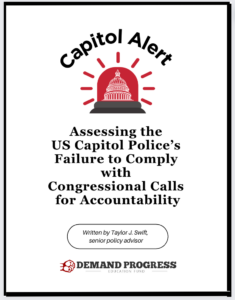TOP LINE
With only 12 working days after recess to avert a federal government shutdown, the interfactional dynamics of the House remain unchanged. Last week, the House Freedom Caucus once again saber-rattled about a government shutdown and declared their objection to being jammed in December.
The Senate also has conceded that this year’s farm bill will be late, too, pushing another significant legislative lift into the end-of-year scramble.
Meanwhile, House leadership is talking about the top priority when work resumes: impeachment.
Interested in offering an amendment to the House NDAA? Surprise: the deadline is August 30th.
What’s below:
- The intersection of committee appointments and political power
- A week focused on congressional technology
- Ethics in Congress and the courts
- The legacies of J6
WHO’S THE BOSS
Appropriations race. A bunch of Republican freshmen are chasing the soon-to-be-vacant appropriations seat of Rep. Chris Stewart, who is retiring from Congress on September 15. Also affected are Stewart’s seats on the Intel Committee and Judiciary Committees. Putting aside the Intel Committee spot, which is chosen by the Speaker but IMHO should not be, the process of how members get chosen to serve on committees is an incredibly important, fascinating, and hidden lever of power.
House Republicans are slightly more transparent than Democrats on this issue, publishing their list of Steering Committee members and the rules of their conference. House Democrats, by comparison, are publishing the rules of their caucus but have not publicly published their Steering and Policy Committee members. (We’ve previously looked at the question of who serves on the steering committee.) Incidentally, according to the House Democratic Caucus rules, there’s a separate set of rules for their steering and policy committee that are supposed to be in writing (see Caucus Rules 10(b)), but no one we’ve spoken with has ever seen those rules. We have begun to wonder whether they exist or are adhered to.
In the Senate, Democrats have published their conference rules here and listed the steering and outreach committee members here. Republicans, who historically have been on top of this, have apparently not re-upped publication of their conference rules — here’s what they had for the 117th — and I don’t know where to find a list of members of their Committee on Committees.
At least in the House, and especially for the Democrats, the steering committees are weighted towards leadership control, who get extra votes and name many members of the steering committee itself. It wasn’t always this way, in fact, at times leadership was largely locked out of the selection process. In the modern era, the Democratic Leader has obtained major control over this process. The Republican Leader, too, has significant control.
Political power in Congress rests on three legs: appointment to committees, control of the floor, and political fundraising. The story of how party leadership emerged and took control of these tools to aggregate and retain power is a fascinating one. (If you’re interested, Galloway’s History of the House of Representatives is a good, book-length place to start.) We have significant concerns that the over-centralization of power in the hands of a few people in the House is making it more unstable and less productive, which is why our sister organization Demand Progress released reports that recommend how to modernize those rules.
Both the chamber and the caucus/conference rules put limitations on who can serve on the various committees. The chamber rules have a light touch, but will say, for example, that committee membership must include someone who sits on another committee. The House routinely waives these requirements. The caucus/conference rules have additional restrictions and lay out a process by which people can self-nominate. The party will balance various factors, such as geographic diversity, seniority, and so on.
The caucus/conference rules are often waived and modified to serve the needs of leadership. They’re used as a discipline tool through which leadership punishes members who don’t toe the line. That’s often couched in terms of a member being in violation of some rule, but the rules in our time reflect the prerogatives of leadership to an extent that is unhealthy.
Naming Stewart’s replacement may rekindle Republicans’ discussion about the conference’s current term limit rules. The Huddle reported that the group may revisit the current rule of three terms as either chair or ranking member when naming Stewart’s successor because a number of current committee chairs would hit the limit after this Congress and would require a waiver to remain. This issue emerged when Rep. Virginia Foxx requested a waiver in January to remain Chair of the HELP committee. Holding firm on the current rules, of course, would benefit less senior members.
At times, what’s really happening with appointments is a fight between the different political factions within the party over whose allies get to serve in powerful positions. This is not necessarily an ideological fight, but rather that members of senior leadership have their own networks and seek to install their friends. Interestingly, the folks who hold senior leadership positions inside the party are often political rivals, although that’s papered over for public consumption. These networks are revealed to the extent you can figure out which members voted for which candidates for a committee, whether in the steering committee or a vote of the entire caucus/conference.
It’s notable that more junior members of the Republican caucus have been the most willing to organize to push back on leadership dominance, meaning reconsideration of chair/ranking term rules would create ripples within the broader dynamics of the caucus. Anyway, it’s interesting to see this process play out with respect to filling the vacant spot on appropriations, which is one of the few places a member can actually move any legislative ideas.
